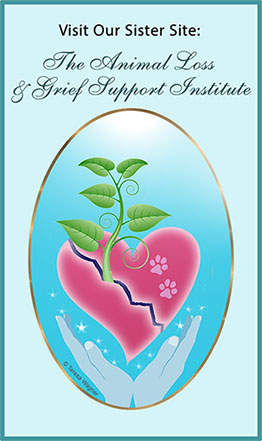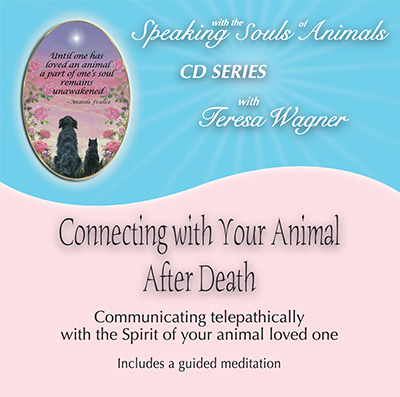Workshops & Events
Animals Grieve Too:
Helping Animals Through Loss, Grief & Rehoming;
Creating a Legacy of Support for Animals We Love
For When We Are No Longer With Them

|
LENGTH: |
A 2-part teleclass, totalling 5 total hours |
|---|---|
|
OFFERED |
This is an on-demand teleclass to take anytime, at your convenience. |
|
COST: |
$125 includes: |
|
|
Click here to purchase This is a required class in the Animal Loss and Grief Support Training and Certification Program. If you wish to take this class for credit in the program please see Certification Requirements and This email address is being protected from spambots. You need JavaScript enabled to view it.. |
|
INSTRUCTOR:
|
Teresa Wagner, M.S., Program Founder Anyone who would like to:
• Better understand how animals grieve, the circumstances that often trigger grief and grief related stress to animals • Learn specific ways to help animals cope with and heal through loss, grief and starting over when they have lost their families, their friends or their home. • Examine a multitude of ways we can prevent and minimize the grief and grief-related stress and trauma of companion animals and all animals via our everyday lifestyle decisions • Learn how to leave a legacy of physical guardianship and emotional support for your animals’ care if you die or are no longer able to care for them If you love animals, and if you believe in the power of love between humans and animals to heal, you will enjoy this class! If you want to be well prepared to help animals you love with their grief and grief-related stress or trauma, you'll learn how in this class. The class is also relevant for those in grief support roles who want to better understand animal grief and to support clients with grieving animals. Click here to read comments from class participants
|
CONTENT AND PURPOSE:
The purpose of this class is to help humans become more aware of and sensitive to the very real grief that animals experience, and how we can plan for and provide support for their grief-related stress and trauma in various situations of loss and transition, including rehoming. Though this class is for human participants and human learning, it is ultimately a class to serve the animals.
When I began my professional animal communication practice in 1991, I learned two things fairly quickly: that animals have the same emotional range as humans; and that they are each unique in the way they experience and express their emotions--just like humans. Anthropologists and scientists at times concede that some animals might grieve given observed behaviors, but they often speak of it in cool, unemotional terms. They seem reluctant to acknowledge that anything that cannot be proven in physically measurable terms could actually be real, and that somehow only animals with brains the size of human brains or larger may have such emotional capacities. In New Age circles, erroneous myths and assumptions abound that animals either don’t feel grief because "they all live in the moment and do not hold onto any emotions" or they get over it quickly, based on theories that animals are “more evolved” than humans and so they do not experience emotional suffering.
The idea that animals do not grieve or suffer from loss is usually circulated by people who don’t talk with animals. But when we do, when we have full, interactive conversations with animals who have experienced loss, carefully listening to their stories and being open to fully witness their pain, it is abundantly clear that they grieve. Sometimes their grief is so obvious from observation alone that only a tightly closed-hearted person would deny that their grief is real. There is no hierarchy amongst species regarding who grieves. All beings grieve. All we need do is listen to know this truth.
In this class we’ll discuss dozens of true stories of animals grieving--from elephants, whales, chimpanzees and snakes in the wild to dogs, cats, birds, horses, cows and goats living with humans. We’ll review specific ways to support animals who are grieving, whether it’s helping your own companion animals through the loss of a family member (animal or human), helping your adopted rescue animals cope and heal from their losses and grief from their past, wild animals grieving the loss of loved ones from natural disasters or from intentional human killing and from being kidnapped and forced to live in captivity. We’ll discuss ways in which we can anticipate and plan for potential grief and grief-related stress of our animal companions to help mitigate their stress and emotional pain. We'll also review ways in which we can help wild animals who are grieving even without being anywhere close to their physical location. Participants will have the opportunity to share stories of their own animals grieving which to be discussed during the class.
The outline of content covered in the class includes:
Acknowledging and understanding that animals grieve just as we do
- True stories of animal grief
- Viewing animals through the lens of biocentrism versus anthropocentrism
- Understanding that animals are individuals and each grieve differently and uniquely
- Prudence's story from Love Saves the Day
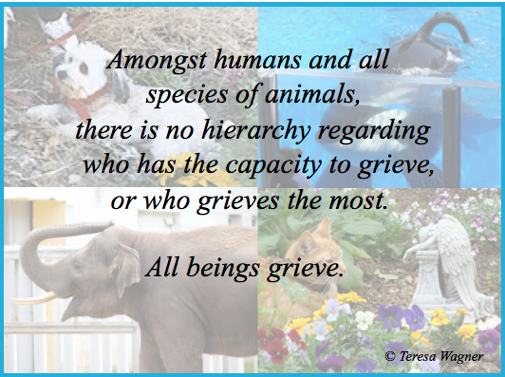
Increasing our awareness of typical circumstances in which animals experience grief and grief-related stress
- Death (i.e, of their humans, of beloved animal family members, companions, friends) Abandonment (i.e., at shelters, rescue groups, the streets, the countryside, left in a home or property humans have moved from, being given away)
- Family structure changes (i.e. divorce and separation, primary human brings new human into the family who does not like animals; primary human brings new human into the family and now prefers that human to the animal; human baby comes into the family and suddenly animal is no longer important or a priority)
- Housing and home base changes for companion animals
- Habitat loss for wild animals
- Temporary separation (i.e., humans on vacation, business trips, hospitalized) Being sold, often repeatedly, and treated as a commodity, not a living being whose needs count (i.e., some horses, show dogs and cats, captive animals in zoos and aquariums)
- Having one's babies taken away (i.e. in the dairy and other farmed animal industries, the cattle industry, horse breeding industry, the captive cetacean industry)
- Witnessing one's family member or loved one being killed (i.e. the cetacean slaughter industry, the food animal industry, a companion animals seeing a human killed)
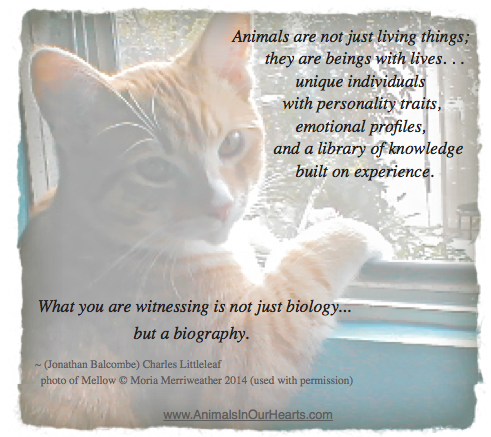
How we can help animals through loss, grief and starting over
- Be alert, be aware and acknowledge their loss
- Listen, listen, listen with empathy: Listen with your heart; Learn to talk with animals telepathically (or seek professional consultation when needed)
- Learn how to send calming and healing energy to any animal, in any location, at any time
- Provide other grief support healing resources such as flower essences, empathy, conversation and gestures of reassurance from the heart, hands, eyes, voice and energy healing
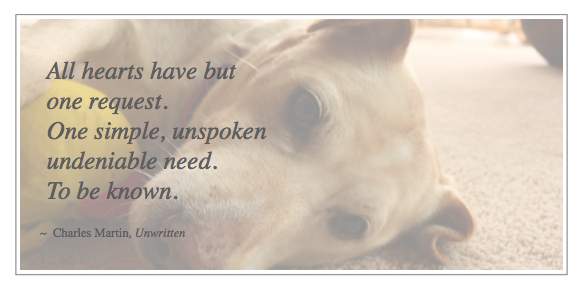
How we can prevent grief and grief-related stress for animals
- Anticipating and planning for potential changes in animal companions’ lives that cause grief and grief-related stress
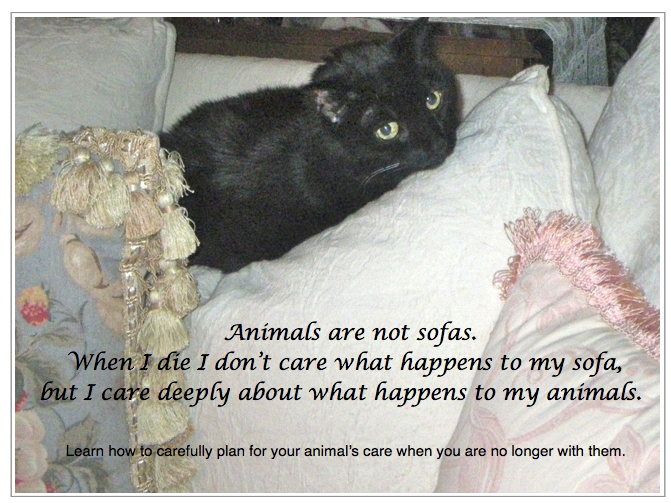
Creating a Legacy of Support for our animals' physical and emotional care if we die before they die, or if we are no longer able to take care of them
- Biggest Mistakes People Make Regarding Their Animals’ Care After Their Death or When Incapacitated
- How To Avoid These Mistakes
- FORM: What Do I Want for My Animal Loved Ones If I Die Before Them or Become Incapacitated and Can No Longer Be Their Guardian?
Physical Guardianship
- Considerations in choosing the best person(s) or organization as guardian for your animal
- Provide detailed information of your pet’s history, important care providers & daily routine so their guardian can care for your pet as you would
- FORM: My Pet’s History and Important Health and Care Information
Financial Support
- For food, healthcare, pet sitting/boarding, dog walkers, groomers, training and other expenses
Emotional Support
- Emotional needs and issues
- Emotional support I want my animal to receive
- FORM: Profile of my pet’s personality, behavior and routines
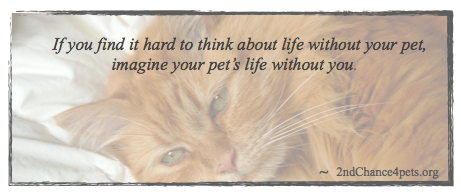
NOTE: Required reading for this class includes the book, Loves Save the Day by Gwen Cooper, New York Times Best Selling Author. The experiences and perspective of the cat in this book will be discussed and reviewed in the class.
http://www.amazon.com/Love-Saves-Day-A-Novel/dp/0345526945
For those interested in helping whales who are grieving and in distress, the dvd Blackfish is highly recommended to further understand the losses, grief and traumatic stress of captive whales.
COMMENTS FROM CLASS PARTICIPANTS
Great class! Topics were interesting and informative. Handouts are great to have for reference and as worksheets. Lots of links to additional resources. I was glad to see that rehoming was included as well as fostering. My most significant learning from the class is that animals are individuals and grief will manifest differently for each of them. Always great to learn from Teresa's extensive background and experience.
~ Robin S, Northridge CA
The group exercise on sending love and calm was extremely valuable. I tried sending love and calm to shelter dogs today and did feel that it helped them. There was a noticeable difference in temperament from shaking and very shy to relaxed and happy. It works! Thank you so much.
~ Kelly S, Manchester MA
It was a simple reminder that all living things have a cause and effect relation in our lives and all living things have a right to their preferences regarding their life and choices. I received the guidance that sending love for even just a minute is a valuable tool; sending love and healing to the mass consciousness of all animals would be just as valuable. Her experience with these past issues were very valuable.
~ Kristin W, Chicago, IL
The class was eye opening as far as how animals grieve, what can help them and that they don't always show their grief to us even though they are in emotional pain. I also didn't realize that there is a change in their role in the home. That they can feel confused about their place.
I've known that the death of my mother and all the turmoil was hard for her dog Tess and with so much going on, there wasn't a lot of help for her. I better understand now why her behavior changed when I took her home.
The handouts weren't just information but an excellent workbook for what we need to do. The web sites were an eye opener. What I hadn't thought about but had experienced was the illustration of Anthropocentrism. It's true. Teresa was great at guiding the study and input. Brought out a lot of information that we usually don't think and need to. The animals and their needs are the focus and the help we need to take care of them was well presented.
~ Linda Kirsch, Willits, CA
The group exercise on sending love and calm was extremely valuable. I tried sending love and calm to shelter dogs today and did feel that it helped them. There was a noticeable difference in temperament from shaking and very shy to relaxed and happy. It works! Thank you so much.
~ Kelly S, Manchester, MA
This was a very comprehensive, extremely thorough and detailed class covering the many varied ways and situations where animals do indeed suffer and grieve. Teresa's always exemplary organization, range of experience, discernments, biocentric perspectives, and deep thought that she put into the topic made this class MORE than worth taking. Despite already having become quite familiar with much of the content through my own path and experience, having it all handily researched and grouped together in her extensive and beautifully presented handouts created an invaluable wealth of information and brilliant tools to keep on hand and work through! Class participation was also helpful and informative. As ever, Teresa's soothing voice and gentle guidance throughout helps ease you through most unsettling emotions evoked from the material. I admire, respect and love Teresa and her works SO very much! EVERYONE who cares for an animal, or is asked to be a possible, future guardian, should take this class!!
I can't say enough about Teresa and her classes, She always frames things so eloquently and gently, is highly organized, is a fellow deep thinker, is very compassionate, has excellent timing, and delivers such superb value in her classes!
The handouts were excellently done, beautifully illustrated, and most of the quotes/posters used were outstanding and on point!
~ Debra H, Okotoks, Alberta, Canada
EFT: The Emotional Freedom Technique
for Illness, End-of-Life, Caregiver Stress and Healing Grief
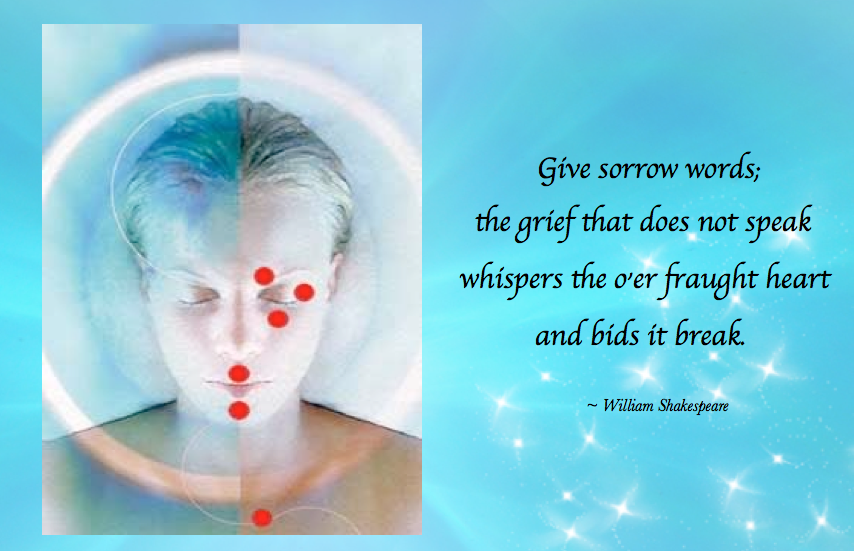
|
LENGTH: |
A 3 part teleclass, 5 1/2 total hours |
|---|---|
|
OFFERED |
This is an on-demand teleclass to take anytime, at your convenience. |
|
COST: |
$99 includes: |
|
|
Click here to purchase This class is one of many in the |
|
INSTRUCTOR:
TESTIMONIALS |
Linda Epstein, Energy Healing Practitioner • To cope with and heal the challenging and sometimes overwhelming emotions of grief and loss, including anticipatory grief Click here for comments from class participants |
CONTENT AND PURPOSE:
Grief from the loss of a loved one, whether human or animal, is an issue for which our hearts need tender compassion and healing. The Emotional Freedom Technique (EFT) is an extremely powerful, easy to learn and easy to use tool that helps decrease and release emotional pain and overwhelm to help us both cope and heal.
EFT is a meridian-based energy therapy which was developed by Gary Craig. It is often referred to as the emotional version of acupuncture except without the use of needles. Tapping on certain meridian points on the body with our fingers while saying specific statements helps us release emotions or beliefs that may be overwhelming, challenging, difficult or negative in any way.
EFT is very gentle, very healing and very easy to learn. With practice, one can apply this technique within an hour. EFT does not make us forget what happened, it does not make grief magically disappear, but it most definitely can lessen the intensity and discomfort of the pain of grief. It also helps us find relief from grief related emotions such as guilt, sorrow, anguish, anger, or depression--feelings that may be hard to cope with and at times may feel as if they are preventing us from moving forward in life.
This 6 hour teleclass teaches the basics of The Emotional Freedom Technique and how to apply this technique to our personal situations. At the end of the three week teleclass, participants will be equipped with the knowledge on how to use EFT not only for grief, but for any challenging experiences--from minor irritations to traumatic crisis--that are part of normal life.
Session 1: The Basics of EFT and Initial Practice
Creating the Healing Circle
Introduction
What is EFT?
How EFT can help the grieving and healing process
Learning the language: Set Up and Reminder Phrases
Clarifying the issue for successful results
Learning the tapping points
Understanding the Aspects, the many layers of an emotional issue.
The SUDS Testing
Borrowing Benefits in tapping for others
Donna Eden Exercises to unscramble homolateral energy patterns and hook up
your meridians
Exercises: Tapping on the emotions of:
Anguish
Pain
Loss
Guilt
Exercises: The Tearless Technique
Session 2: Focus on the specifics of each person’s issues, tapping on the issues that were identified in the homework.
The goal is to reach a level where the issue registers below a 4 on the SUDS scale.
Opening with the Healing Circle
Discussing homework, feedback, problems creating set up statementss/reminder phrases
Group tapping for as many people as time allows for those granting permission for tapping
Discussing any aspects that popped up
Discussing the borrowed benefits: while tapping for others, did it help you with your issuue?
Discussing the results or reactions during the tapping session
Dealing with your physical responses to your emotions
Session 3: Alternative Methods of tapping when EFT is working too slowly or not at all
Discussing homework, feedback, problems creating set up statements/reminder phrases
Discussion of Reversals and the causes
Buried core issues
Dealing with negative beliefs
Tell the Story (if time permits)
Exercise: “Personal Peace Procedure” which can be used any time to help bring
one back to a state of balance and harmony.
Review from each participants of where they are compared to where they were when starting
the three week class
Closing of the Healing Circle and Blessing
I would most definitely recommend this class to anyone working on grief or wanting more knowledge about EFT. I was able to tap into and release very deep trauma. It was some very heavy duty stuff that was deeply suppressed. The EFT led me down the road to get there and I am feeling much lighter and more me as a result. Linda is a phenomenal teacher and healer. I am infinitely grateful to her and for her. I love it that she and Teresa are working together. It is great to see such beautiful, big hearted, and powerful women teaming up. Particularly in the healing arena. Healing is so powerful for all involved. It is what brings us back to our core and our connection to Source/God/Creator and all that is.
~ Lori K, Baltimore, Maryland
The teacher was so supportive and questions were well explained. Even past the tapping exercise, it helped to learn the ways we block the energy and what can cause energy reversal. It also helped to learn the experience of others and how they dealt with and overcame issues. I feel like I've been given an extremely valuable tool chest. I feel it has opened doors for me. It's a tool that I can use and develop the rest of my life. Like flower essences, it's very effective.
~ Linda K, Willits, California
Linda has a very soothing voice that draws you in. And she answered everyone's questions beautifully. Plus it wasn't high pressure...we laughed and had fun moments too. I feel I will be using EFT for the rest of my life! It is simple and can be done quite quickly during a moment of panic! ~ Rayanne S, Morriston, Florida
It was extremely well organized. Loved the exercises and handouts. ~ Dolly R, Sunnyvale, California
The handouts and exercises were extremely detailed and very helpful. Applying EFT to other issues in my life. What a valuable tool and resource this is.
~ Debbie O, Lake Forrest, California
Extremely valuable. The explanations are very clear and Linda explains very well. The class gave me answers I was uncertain of from reading about EFT. Knowing how easy it is to access at anytime, anywhere!
~ Rachel R, Carmel, California
EFT is easy to learn and is a valuable tool for releasing emotions like sorrow, grief, anger, etc. Handouts were clear and informative. Linda's soothing voice, clear instructions and patient guidance, made EFT easy to learn and practice.
~ Rosann L, Monterey, California
Understanding Trauma and Post-Trauma Stress--
Including How It Impacts Loss and Grief

|
LENGTH: |
A 3-part teleclass: 8 total hours |
|---|---|
|
OFFERED |
This is an on-demand teleclass to take anytime, at your convenience. |
|
COST: |
$199 includes: |
|
|
Click here to purchase
This is a required class in the Animal Loss and Grief Support Training and Certification Program. If you wish to take this class for credit in the program please see Certification Requirements and This email address is being protected from spambots. You need JavaScript enabled to view it.. |
|
INSTRUCTORS: |
Teresa Wagner, M.S., Program Founder and Stephanie LaFarge, Ph.D., Senior Director of Counseling Services, ASPCA
|
TESTIMONIALS (click to view)
CONTENT AND PURPOSE:
Participants who complete this class acquire a solid, psychological understanding of trauma, traumatic bereavement, post-traumatic stress, complex post-traumatic stress and the reactions and symptoms involved. They will also gain a greater understanding of how their own trauma experiences impact their effectiveness in helping others and learn effective psychological and energetic tools to support others who have been traumatized.
The class process includes presentations, dozens of handouts of information and exercises, discussion, and reading material and private exercises to complete between class sessions.
Trauma can make us feel like we have lost our footing and our place in the world. A life that once felt safe, normal or rewarding may now seem fragile or like a lifeless vacuum. Nothing may seem the same. Life as it was may be gone. Our sense of security may have disappeared. It can make us feel afraid and even terrorized. A cherished, fundamental source of love may have been stripped away. Traumatic loss can make us feel unhinged, ungrounded, paralyzed, unsure, unsafe, vulnerable, alone, and wondering why the rest of the world goes on while we question whether we can. Some forms of trauma, such as abuse, can create deep-seated, unconscious beliefs that we are unlovable, unworthy and that life may always be in some ways unsafe.
Helping people and animals with trauma requires a special sensitivity to their unique needs, an understanding of trauma, as well as an ability to remain not merely loving and compassionate, but calm, highly empathic and fully present no matter how intense the clients’ pain, no matter how frenzied or off center their energies may be or how disturbing their stories may be to your heart.
Effectively supporting people and animals who are in trauma requires knowing when to help them stabilize and cope and when to guide them to go more deeply to heal. It means always knowing that no matter what healing tools we have in our repertoire of expertise, our ability to gauge what the client needs at any moment must precede offering tools, and that building and maintaining trust is foremost. While this is true in all helping relationships, it is crucial with those in trauma.
The work of internationally recognized trauma specialists Judith Herman, M.D., Aphrodite Matsakis, Ph.D., Babette Rothschild, M.S.W., Edward K. Rynearson, M.D. and John Wilson, Ph.D. have been incorporated into the content of the class. A detailed list of further reading and resources list is provided for future reference and learning.

Session One:
Understanding Trauma Conceptually
- Definitions: Trauma, Traumatic Bereavement, Post-Traumatic Stress,
Complex Post-Traumatic Stress, and Secondary Traumatic Stress/Compassion Fatigue - Symptoms of Post-Traumatic Stress and Factors Impacting Severity
- Types of Traumatic Death and Responses to Traumatic Death
- Risk Factors for Traumatic Bereavement
- Factors Influencing the Grief Experience and Possible Complicated or Traumatic Bereavement
- Understanding the Trauma of Special Circumstances of Loss and Unique Needs of Grievers
Sudden, unexpected or violent deaths
Multiple losses
Missing Animals
Moral dilemmas - An Energetic Chakra View of the Impact of Trauma
- A View of Trauma from Maslow’s Hierarchy of Needs
- Trauma With a Net? Trauma Without a Net?
- Potential Positive Effects of Exposure to Trauma
- Differences Between Coping and Healing

Session Two:
Understanding Trauma Personally
- Examining our Personal Trauma Histories
Exercise: My Personal Trauma Profile
Building acute awareness of these experiences, how we responded, how our lives were
impacted, what beliefs we created from the experiences, what has been
actively addressed in healing and what may still need healing attention - Understanding and Recognizing How Our Own Trauma Experiences Impact Our
Effectiveness in supporting others--both positively and potentially negatively - Generalizing: The Harmful Use of Self-Awareness of One’s Healing Experiences
Assuming what worked for us will work for others and imposing that as “help” - The Double Duty Role of Helpers:
Being fully present and empathic with clients
Being fully present and empathic with our own issues and alert to which may be triggers - Preventing and Dealing with Personal Triggers and Countertransference
Becoming alert to our very real and natural reactions to client personalities, information and stories - Planning For and Committing to Ongoing Self-Awareness and Self-Care

Session Three:
Helping Others with Trauma
Who We Are and What We Bring to the Client and the Helping Relationship
- Understanding the Intersection of Who We Are with Who the Client is and Their Trauma--
Sensitivity to differences and creating common groud to communicate - The Four Elements of Effective Facilitation of Helping:
Offering Love and Compassion, Energetic Boundaries & Ethics, Empathic Inquiry
& Response, before Offering Specific Strategies and Tools - Willingness and Ability To Be Present With Intense Emotional Pain and Stories of
Others without Recoiling, Denying or Diminishing Their Pain,
and/or Feeling Compelled to Swiftly Fix or Stop Their Pain - Being Absolutely Scrupulous About Not Judging What May Be Traumatic for Others,
or Reframing Their Pain or Situation From Our Perspective or
Value System and Imposing Our Personal Views onto Them - Being Calm in the Face of Another’s Emotional Frenzy, Meltdown or Shutdown
Offering Specific Tools and Resources
- Critical Incident Debriefing
- Differences Between Coping and Healing & The Importance of Trust and Stability FIRST
Tending to stability and trust--both in the relationship and for the client
Symptom management for needed temporary relief and functioning
Addressing root causes for long term healing - Encouraging the Telling and Re-Telling of the Trauma
Holding the space for the traumatized person or animal to express all that may need to be expressed
Remembering that logic can be irrelevant in the height of trauma or post-trauma stress and to not force logical perspectives onto clients - Listening, Listening, Listening with Skill and Purpose
Empathic inquiry to learn their story, their feelings and thoughts
More empathic inquiry to gently ask for clarity when needed
Empathic response to let them know you’ve been listening and attempting to understand - Specific Tools to Offer or Refer When Relevant and When Client is Interested
EMDR, EFT, Flower essences, Journaling, Art Therapy, Books; Classes, Therapists
and Healing Practitioners - Knowing When and How to Refer to a Therapist
- Handling Comments About Suicide
- Case Scenarios: How Would You Respond to this Person or Animal in Trauma?
- Summary of Do’s and Don’ts To Provide Safe and Effective Trauma Support
- Further Resources
TESTIMONIALS
The class was very thorough and thoughtfully put together. Teresa has a unique gift for teaching others how to help those suffering from life traumas. This is not easy work, as there are so many delicate layers involved, but Teresa breaks it down in a way that is easy to digest and put into practice.
~ Lorraine K, Fallston, MD
So much rich information. I learned many new things. I do believe this class has both deepened and created shifts in awareness. I feel that I learned some really helpful ways to work with clients in trauma. Especially in languaging. For me, it helped me have ways to stay neutral, present and open. And how to gracefully work with "curve balls"--situations that start out as one thing and shift into something else during the session. This was a fantastic class! I will definitely use the materials again and again. I would recommend this course to others. As always, Teresa is a wonderful instructor/guide/facilitator, Dr. Stephanie LaFarge was probably the other highlight for me. I enjoyed the program, and wish it was longer :).
~ Julie L, Madison, WI
I learned that the situations I thought of as "just life" were actual traumas deserving of healing, not just coping. Loved the exercises and referrals. Opened me up to understanding how we can be traumatized and all of the various methods of healing. I am in awe of Teresa’s knowledge of both clinical and healing arts worlds and I have never met a more empathetic, loving person...and adore her love of animals!
~ Henriette A, Palm Desert, CA
The class gave me insight into myself and knowledge of other ways to help myself and others.
I now have more resources for myself and for further healing so am more effective in helping others.
~ Linda K, Willits, CA
The exercises that focussed on our own trauma were extremely helpful. They not only helped me to recognize the degree of trauma I've experienced in my life (both minor and major), but also enabled me to view the trauma from the place of a compassionate witness rather than becoming entrenched in the past experiences or memories. This created an overall feeling of space and compassion for myself and all I have been through, rather than judgment. The class also helped me recognize how my personal traumas could impact my work with my clients, both in a positive way (from a place of compassion because I, too, have experienced trauma) and in an unhelpful way (if my own traumas have not been resolved).
It helped me get even clearer about the importance of language, tone, what is said, and how it's said when helping clients with trauma. Being aware of the the importance of softness of voice; using language and questions that empower rather than lead/direct the client; helping the client to feel safe and supported; and being aware of the importance of being fully present for the client were all helpful reminders.
My most significant learning from this class was the importance of ensuring that the client feels empowered, heard, supported and safe.
The handouts were superb! I appreciate all of the time and energy that were put into preparing such detailed, well-researched and professional handouts. I loved the quotations that were included. The handouts contained a wealth of helpful information and will be an excellent resource for me to refer back to. I found these very helpful, especially the examples of what might be said to a client. it was really helpful to see the different types of possible responses and to look more closely at why some were more appropriate than others.
Teresa is a superb teacher and communicator. She compassionately holds the space for class participants and has a beautiful way of expressing her thoughts. She is non-judgmental which makes participants feel comfortable in expressing their thoughts, feelings and opinions.
~ Dixie G, North Vancouver BC Canada
This class was amazing, very powerful. I learned so much about trauma, grief and the ways to address this in helping others. The quality, scope and depth of this class was far beyond what I had expected (and I had high expectations!) They were a wealth of knowledge that I could not have found anywhere else. The quality, depth and breadth of the material was Ph.D level...and I was so happy to have it. Handouts were invaluable.
I learned that trauma and post trauma stress has many layers and components. and how trauma's effects can create a sense of disempowerment and disconnectedness for the person.
It was very helpful to understand that working thru my own issues is very important. You can be accidentally triggered by things you might hear....and how to stay present with the client and then deal, later, with your own reactions to this, with a friend or mentor.
This class was a wonderful, multi-faceted learning experience for me....now I want more ! And it was, by the way, so wonderful to be around very evolved people who love and respect animals...the energy was very healing for me, just being around that. I think that this class opened a whole new world of things for me to learn. It not only taught me many new ways to look at trauma and loss, but also I learned the critical factors needed to have a successful client/helper interaction around this subject.
Teresa, is a treasure...her energy and beautiful spirit is on a level I seldom get to experience. The way she set up this class, and taught it, was comprehensive, on a very high level, very clear and was not just a 'class' but also a very powerful experience for me. It simply would not have been the same without her. She is a rare breed of highly developed intellect and a truly evolved soul that I was honored to spend time with. Bless you for all you do for the animals Teresa. You are truly one in a million and we are all very lucky to be able to share in your wisdom and insight on animals and on ourselves. I also got so much out of the insights and comments of the other people who were on the line. And although we only got to scratch the surface with Stephanie LaFarge, she was a wonderful addition to the course as well.
Stephanie was excellent. She showed us a glimpse of the terrible and wonderful world of helping animals and responders. It’s not often that we get the opportunity to spend time with someone of her experience and caliber in the animal advocacy field.
I could go on and on...I learned so much about trauma and about myself and the individual animal beings we share our lives with. Five stars!....definitely I would recommend this to anyone I know in this field.
~ Faye T, Miami, FL


